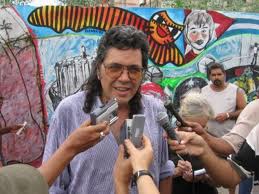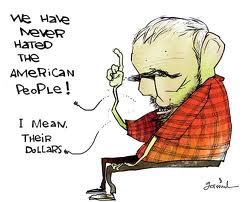
The year, 2050. The regime, still in power. The Coppelia ice cream stand, the most famous in Cuba, is in ruins, and tree roots have played havoc with the granite floor. Amid the rusty iron columns a couple of guys are trying to light a fire. They are rubbing two sticks together in the most primitive way. Moving their hands compulsively, desperately. Suddenly one looks up and predicts, “This is about to come crashing down. I imagine in the coming months they’re going to cut the stick ration in half… then how will we light a fire?”
This joke, which has been around for a couple decades already, is recirculating lately after certain statements by the former Minister of Culture, Abel Prieto. During a gathering at the Dulce María Loynaz center in Havana, he asserted that “Cubans don’t have a single joke that refers to the Revolution, nor to denunciations, prisoners of conscience, and ousted officials . He immediately added that the national jokes rather “talk about scarcities or emigration” but “in a benevolent way, forgiving, without rancor or bitterness.”

Such ingenuous pronouncements provoked laughter, even among those present, despite the official character of the site. The words of the current “Advisor to the President of the Council of State and Ministers” (i.e. Raul Castro) spread quickly, generating derision inside and outside the country. In Cuba-themed forums and sites internauts posted an avalanche of old and new jokes that refer to the prevailing system on the Island. Spontaneous anthologies of everything that has made us laugh; inventories of jokes that have caused us to snicker, even in the darkest moments. No one wants to suggest they can’t remember at least one joke about the system, the leaders in power, or the ideology of the Communist Party.
There is everything. From the usual stories where “Fidel Castro arrives in hell and finds other presidents there…” to the typical jokes starring Pepito, that mischievous boy who appears in many humorous stories. Nicknames, anecdotes, puns and wisecracks that made history have all been dusted off. A festival of derision detonated by the categorical statement of the former minister. As if Cubans had been expecting something completely ridiculous to make them laugh. And they’ve split their sides over it. Because there seems to be a direct relationship between the seriousness of the problems and the ingenuity of our humor, so in times of crisis hilarity wins. The nineties were marked by scarcities and abundant jokes; prodigious in both problems and humor.
Politics has been one of the main themes of popular jokes, along with sex and death. So it’s more than little naive to think that a political process that has lasted 53 years wouldn’t be the subject of scorn and sarcasm. What’s more, few governments have sparked as many jokes as the one led by Fidel Castro, and now his brother Raul Castro. It’s just that they never found a place in the official media, nor on humorous State TV shows, or in the official newspaper supplements of cartoons and jokes. So they circulated orally, unwritten.

It was in the years of the Special Period when Pepito started talking insistently about food. Every week there would be a new story where our crafty eternal child referred to food shortages or the culinary inventions appearing on our plates. He threw sharp darts of humor against government mismanagement and against its stubbornness in not allowing farmers markets or the possession of hard currency.
His jokes narrated the dark present and predicted a worst future. Like the one where the irreverent boy is sitting at the table and before trying the first bite he asks his mom, “Is it true that you once fried the floor rags and ate them like they were steak?” The stern lady just sniffed in annoyance. But the boy returned to the charge. “Mommy, is it true that they sold some monster meat on the food ration and called it “skinless dogs?” A long silence, and then in response the mother shouts angrily, “Shut up Pepito and eat your lizard!”

Stories like this have come to our ears this week, after Abel Prieto opened the Pandora’s Box of jokes. Just to prove the contrary, people have called on their memories and exercised their facial muscles.
But the funniest thing of all is that this man who is now an advisor to the president stars in one of the most famous Cuban jokes of the last two decades, one built on the fact that his last name is a slang word for “black.” It is a play on words that criticizes racism in the police along with the constant persecution of the black market. To the question of, “Who has been the minister most talked about in Cuba”… the answer is simply “Prieto”… thanks to what the cops say in the street: Prieto… whaddya have in that sack? And then comes the prolonged laughter, the cruel mockery.
With popular jokes, it’s better not to get involved, or to try to restrict them. Because they can fight back with a barrage of ridicule, a flood of humor.
30 September 2012
